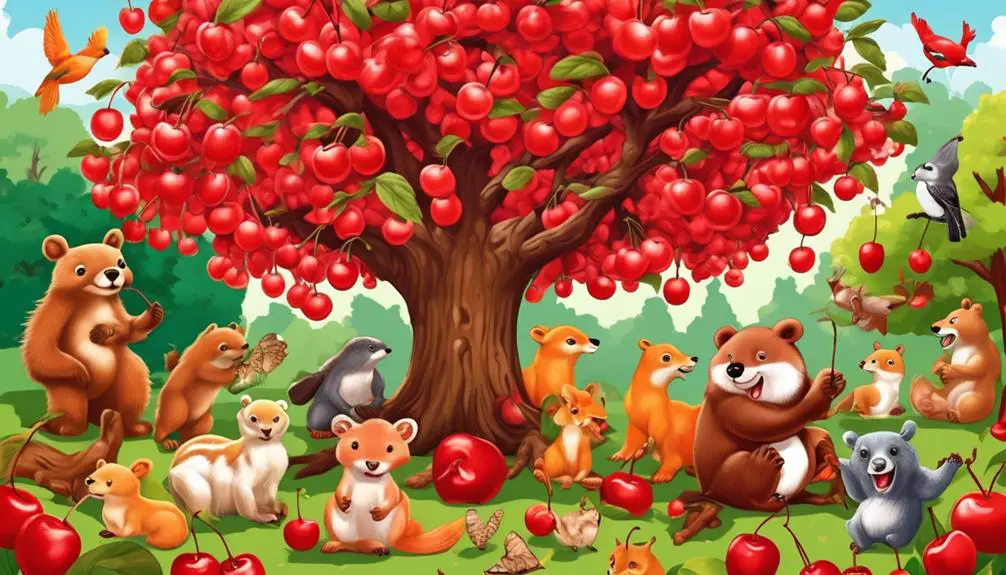Have you ever wondered if animals actually eat cherries?
Well, the truth is, cherries are not just a favorite indulgence for humans. They also hold a certain appeal for a variety of creatures in the animal kingdom.
From herbivorous animals like deer and rabbits to unexpected cherry enthusiasts like ants, raccoons, and even bearded dragons, the allure of this delectable fruit seems to span across species.
But why are animals attracted to cherries? And what are the potential benefits and considerations when it comes to feeding cherries to animals?
Find out as we uncover the fascinating world of animals and their love for cherries.
Animals That Eat Cherries
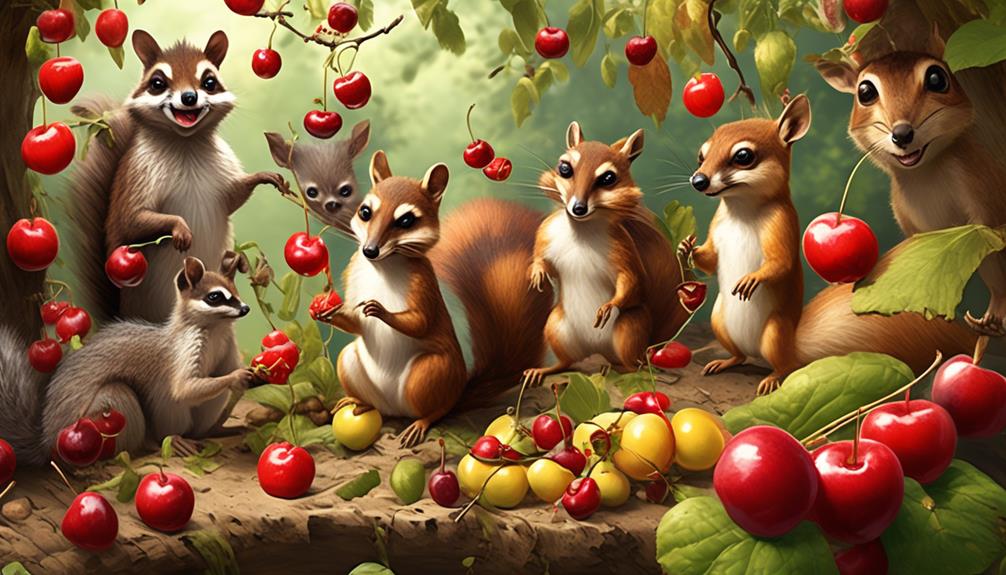
Many animals enjoy the taste of cherries and include them as a part of their diet. Deer, rabbits, guinea pigs, badgers, and possums are just a few examples of animals that are attracted to the sweetness of cherries. These animals find cherry fruit to be palatable and it provides them with an excellent source of energy. Cherries also promote healthy digestion in animals.
However, it’s important to feed cherries to animals in moderation. While animals enjoy the taste of cherries, it’s crucial to avoid overfeeding them. Additionally, ants, raccoons, bearded dragons, squirrels, and various bird species are also known to eat cherries.
For some animals, cherries can be a nutritious addition to their diet as they provide vitamins and antioxidants that can help maintain their overall health. Some animals may even rely on cherries as a seasonal food source.
When feeding cherries to animals, it’s important to remove the pits as they can be a choking hazard. It’s also crucial to wash cherries thoroughly before offering them to animals. Introduce cherries gradually into an animal’s diet and monitor for any allergic reactions or digestive issues.
It’s always best to consult a veterinarian for specific dietary recommendations for each animal species.
Palatability of Cherry Fruit for Animals
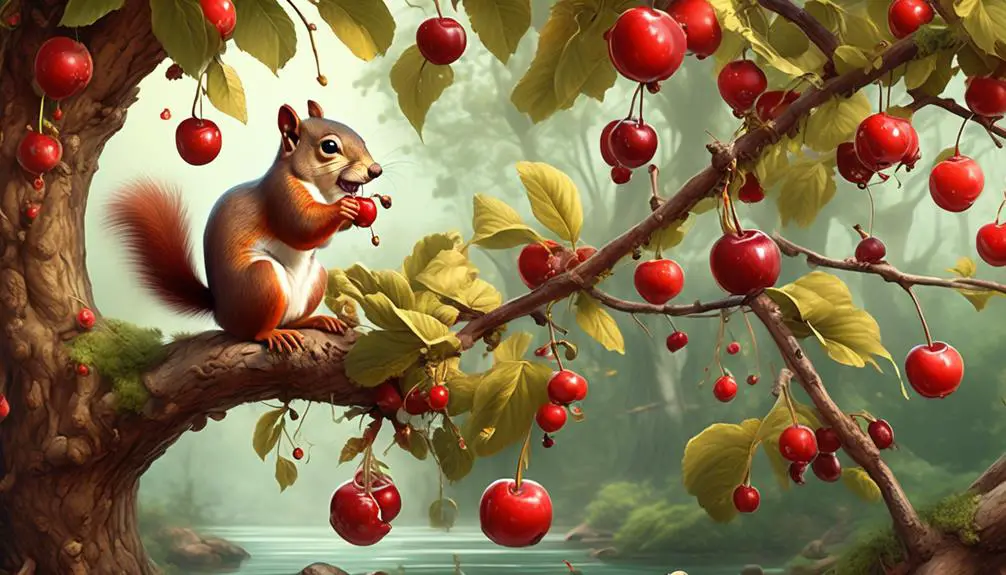
Animals are not the only ones who find cherries to be palatable – cherries are also known to be enjoyed by a variety of different species. The palatability of cherry fruit for animals is evident in their attraction to its sweet taste. Cherries provide an excellent source of energy and promote healthy digestion. However, it is important to feed cherries to animals in moderation, as excessive consumption can lead to digestive issues.
Here is a table highlighting some animals that enjoy eating cherries:
| Animals | Palatability of Cherry Fruit |
|---|---|
| Deer | Enjoy the taste of cherries |
| Rabbits | Attracted to the sweetness |
| Guinea pigs | Find cherries palatable |
| Badgers | Cherries are a treat |
| Possums | Enjoy eating cherries |
Cherry fruit can be a nutritious addition to an animal’s diet. It provides vitamins and antioxidants that help in maintaining overall health. Some animals may rely on cherries as a seasonal food source, making it even more appealing to them. However, it is important to consider a few things when feeding cherries to animals. Avoid feeding cherries with pits, as they can be a choking hazard. Wash cherries thoroughly before offering them to animals, and introduce them gradually into their diet. It is always advisable to consult a veterinarian for specific dietary recommendations for each animal species.
Other Animals That Eat Cherries
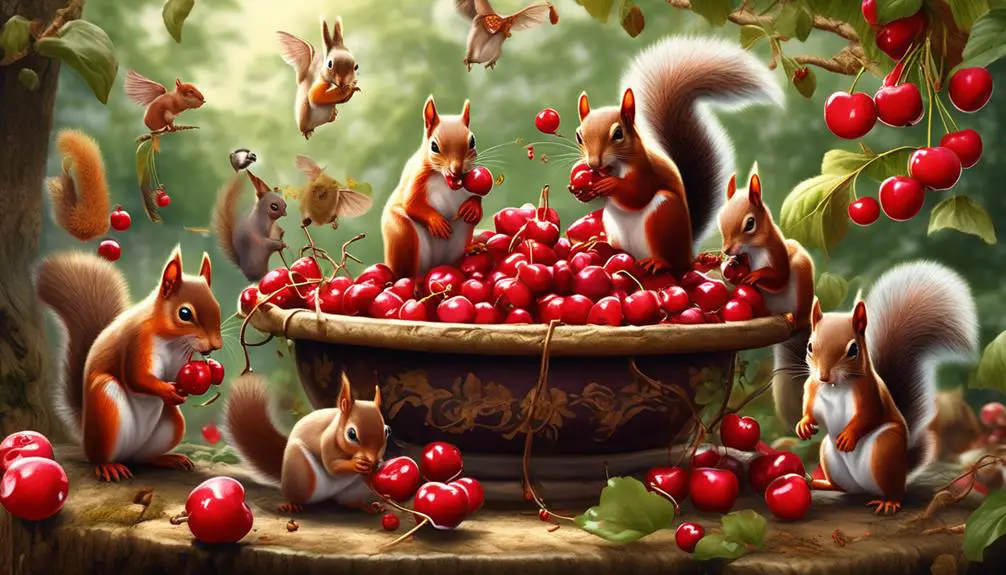
Ants, raccoons, bearded dragons, squirrels, and various bird species are among the other creatures that enjoy eating cherries. These animals are attracted to the sweet taste of cherries and find them palatable. Cherries provide an excellent source of energy and can promote healthy digestion for these animals. They’re a nutritious addition to their diet, as cherries contain vitamins and antioxidants that help maintain overall health. Some animals may rely on cherries as a seasonal food source.
When feeding cherries to animals, it’s important to consider a few factors. Firstly, avoid feeding cherries with pits to animals, as they can be a choking hazard. Secondly, make sure to wash cherries thoroughly before offering them to animals to remove any pesticides or dirt. It’s also recommended to introduce cherries gradually into an animal’s diet to monitor for any allergic reactions or digestive issues. If you have any concerns or questions, it’s always best to consult a veterinarian for specific dietary recommendations for each animal species.
Cherry Fruit as a Dietary Choice
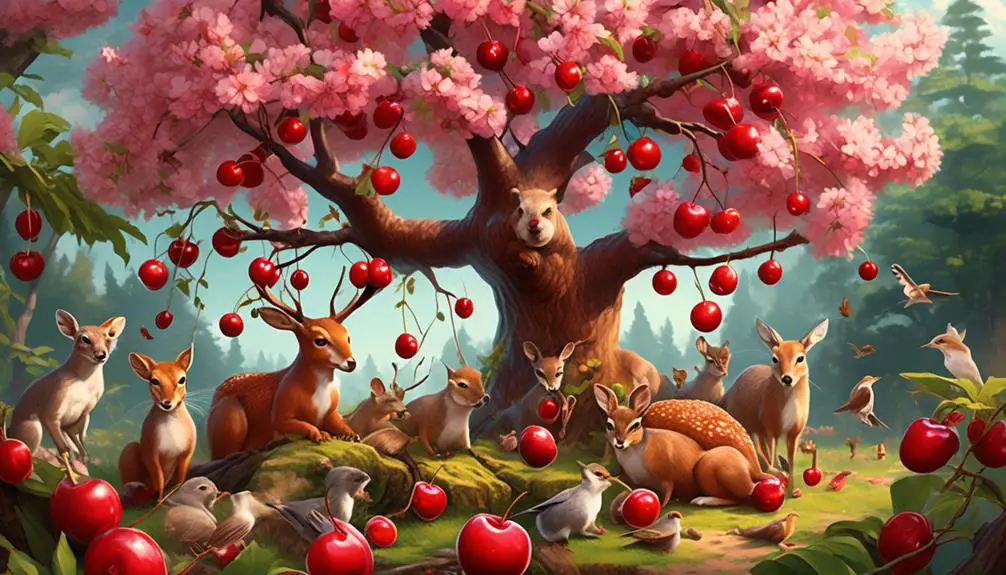
Now let’s talk about why cherry fruit can be a great dietary choice for animals like deer, rabbits, and guinea pigs.
Cherries provide essential vitamins and antioxidants that can support overall health.
Plus, their natural sweetness makes them a tasty treat that animals enjoy.
Just remember to introduce cherries gradually, wash them thoroughly, and remove the pits to ensure safe consumption.
Nutritional Benefits of Cherries
Cherries offer valuable nutritional benefits, making them a nutritious dietary choice for animals. These small fruits pack a punch when it comes to providing essential vitamins and antioxidants.
Animals are attracted to the sweetness of cherries and enjoy the taste. Cherries can be a great addition to their diet as they provide an excellent source of energy and promote healthy digestion. They’re also rich in vitamins A and C, which are important for maintaining overall health.
Some animals may rely on cherries as a seasonal food source, taking advantage of their availability during certain times of the year. However, it’s important to introduce cherries gradually and monitor for any allergic reactions or digestive issues.
Remember to consult a veterinarian for specific dietary recommendations for each animal species.
Cherry Consumption Patterns
When considering the dietary choice of cherry consumption, it’s important to understand the patterns and preferences of animals. Animals are attracted to the sweetness of cherries, making it a palatable fruit for various species. Cherries provide an excellent source of energy and promote healthy digestion. They can be a nutritious addition to an animal’s diet, as they contain vitamins and antioxidants that help maintain overall health.
Some animals may rely on cherries as a seasonal food source. However, it’s crucial to avoid feeding cherries with pits to animals, as it can be a choking hazard. Before offering cherries to animals, it’s recommended to wash them thoroughly and introduce them gradually to their diet. Monitoring for any allergic reactions or digestive issues is also important.
For specific dietary recommendations, consult a veterinarian.
Feeding Cherries Safely
To safely incorporate cherries into an animal’s diet, it’s essential to understand the precautions and considerations involved in their consumption.
While cherry fruit is palatable for various animals and provides an excellent source of energy and promotes healthy digestion, it should be fed in moderation. Animals enjoy the taste of cherries because of their sweetness, and they can be a nutritious addition to their diet, providing vitamins and antioxidants to help maintain overall health.
However, there are a few things to keep in mind when feeding cherries to animals. It’s important to avoid feeding cherries with pits, as they can be a choking hazard. Make sure to wash cherries thoroughly before offering them to animals and introduce them gradually into their diet.
Also, monitor for any allergic reactions or digestive issues and consult a veterinarian for specific dietary recommendations for each animal species.
Nutritional Benefits of Cherries for Animals
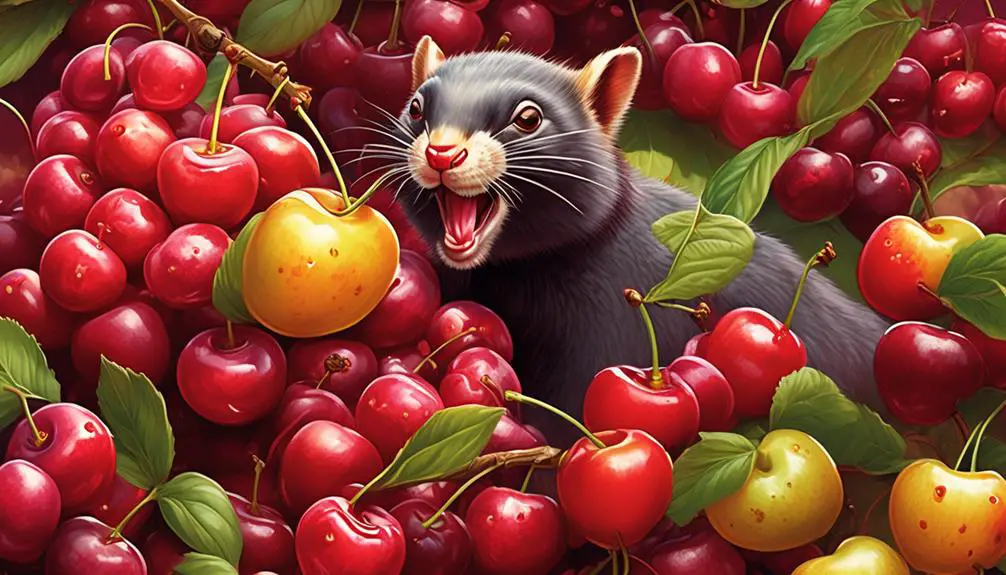
The nutritional benefits of cherries make them a valuable addition to the diet of various animals. Cherries provide animals with a range of essential nutrients that promote their overall health.
First and foremost, cherries are an excellent source of energy for animals, thanks to their natural sugars. This energy boost is particularly beneficial for animals that are active or have high metabolic rates.
Additionally, cherries promote healthy digestion in animals. The fiber found in cherries helps regulate bowel movements and prevents constipation.
Moreover, cherries are packed with vitamins and antioxidants that support the immune system and protect against oxidative stress. These nutrients contribute to the overall well-being of animals, helping them maintain optimal health.
It’s worth noting that some animals may rely on cherries as a seasonal food source, as they’re attracted to the sweetness of the fruit. However, it’s important to feed cherries to animals in moderation and with caution. Always avoid feeding cherries with pits to animals, as they can be a choking hazard.
Furthermore, it’s advised to wash cherries thoroughly before offering them to animals and to introduce them gradually to their diet. Monitor for any allergic reactions or digestive issues, and consult a veterinarian for specific dietary recommendations for each animal species.
Seasonal Reliance on Cherries for Some Animals
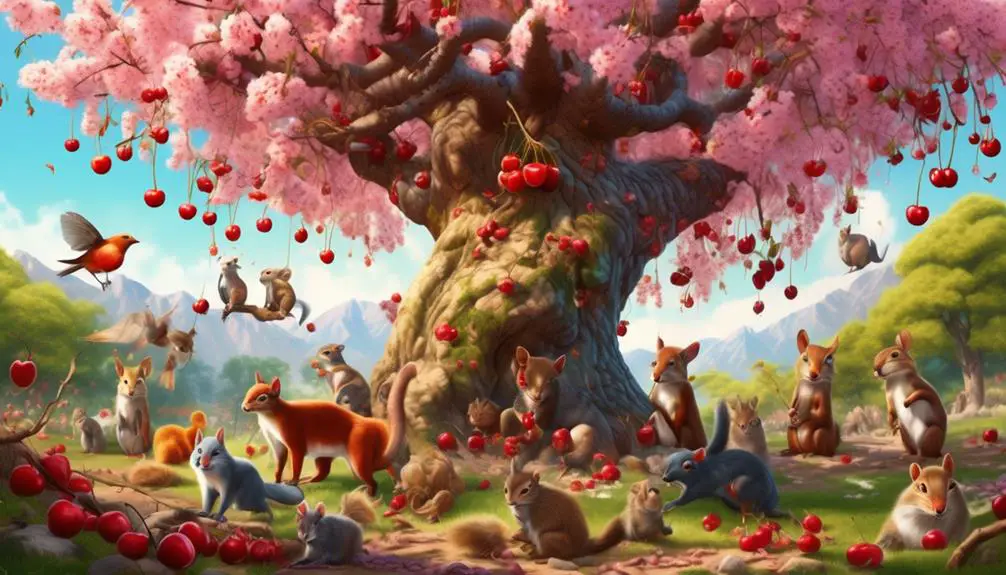
Now let’s talk about the seasonal reliance on cherries for some animals.
Some animals may depend on cherries as a seasonal food source, especially when other food options are scarce.
The nutritional benefits of cherries, such as vitamins and antioxidants, make them a valuable addition to an animal’s diet during certain times of the year.
Seasonal Dietary Dependence
Some animals rely on cherries as a seasonal food source, providing them with essential nutrients and a sweet treat. These animals include deer, rabbits, guinea pigs, badgers, and possums. Cherries are palatable for various animals, offering an excellent source of energy and promoting healthy digestion. They should be fed in moderation due to their high sugar content. Animals enjoy the taste of cherries, making them a popular choice. Other animals that also eat cherries include ants, raccoons, bearded dragons, squirrels, and various bird species. Cherries are attracted to the sweetness of cherries and can be a nutritious addition to their diet, providing vitamins and antioxidants to help maintain overall health. Some animals may rely on cherries as their primary food source during the cherry season.
| Animals | Seasonal Dietary Dependence |
|---|---|
| Deer | Yes |
| Rabbits | Yes |
| Guinea pigs | Yes |
| Badgers | Yes |
| Possums | Yes |
Nutritional Benefits and Implications
Animals that rely on cherries as a seasonal food source benefit from their nutritional value and the sweet treat they provide.
Cherries aren’t just delicious but also offer important nutritional benefits for these animals. They’re an excellent source of energy, providing a much-needed boost to their diets. The high fiber content in cherries promotes healthy digestion, ensuring that these animals maintain proper gut health.
Additionally, cherries are packed with vitamins and antioxidants, which help in maintaining overall health. However, it’s important to feed cherries to these animals in moderation. While they enjoy the taste, it’s crucial to avoid overfeeding as it can lead to digestive issues.
Remember to wash cherries thoroughly and remove pits before offering them to these animals. If in doubt, consulting a veterinarian for specific dietary recommendations is always a good idea.
Feeding Considerations for Cherries
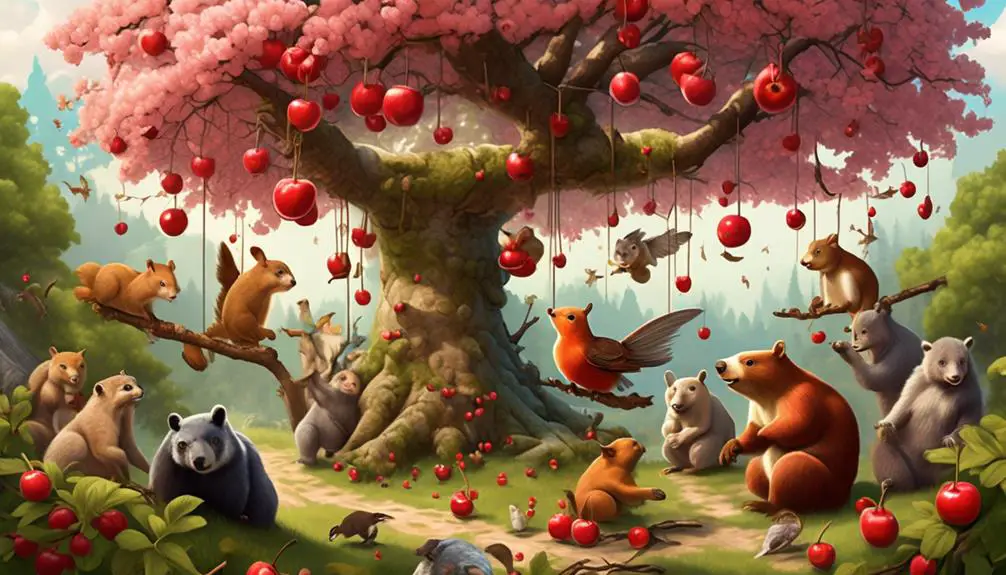
To ensure the safety and well-being of your animals, it’s important to consider certain factors when feeding them cherries. While cherries can be a nutritious addition to their diet and are enjoyed by many animals, there are some feeding considerations to keep in mind.
Firstly, it’s crucial to avoid feeding cherries with pits to animals, as they can be a choking hazard. Make sure to remove the pits before offering cherries to your furry friends.
Additionally, it’s important to wash cherries thoroughly before feeding them to animals. This helps remove any pesticides or dirt that may be present on the fruit.
When introducing cherries to an animal’s diet, it’s best to do so gradually. Start with small amounts and monitor their reaction. Look out for any allergic reactions or digestive issues that may arise.
If you notice any adverse effects, it’s important to consult a veterinarian for specific dietary recommendations for your animal species.
Choking Hazard With Cherry Pits
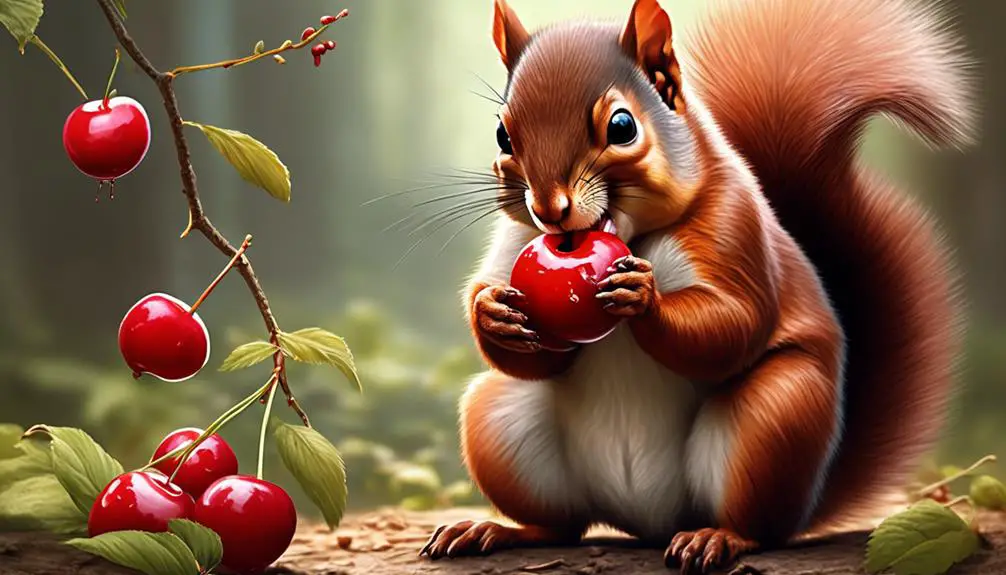
Be cautious when feeding cherries to animals, as the pits can pose a choking hazard. The pits of cherries are small and hard, making them difficult for animals to chew and swallow safely. If an animal accidentally swallows a cherry pit, it can become lodged in their throat, potentially causing choking or other serious health issues.
While cherries themselves can be a nutritious addition to an animal’s diet, it’s important to remove the pits before offering them to your furry friends. To prevent this choking hazard, always remove the pits from cherries before giving them to animals. Simply cut the cherry in half and remove the pit with a knife or your fingers. It’s important to be thorough and ensure that no pits are left behind.
Additionally, be mindful of any fallen cherries with pits in outdoor areas where animals roam, as they may be tempted to eat them.
Importance of Washing Cherries Before Feeding
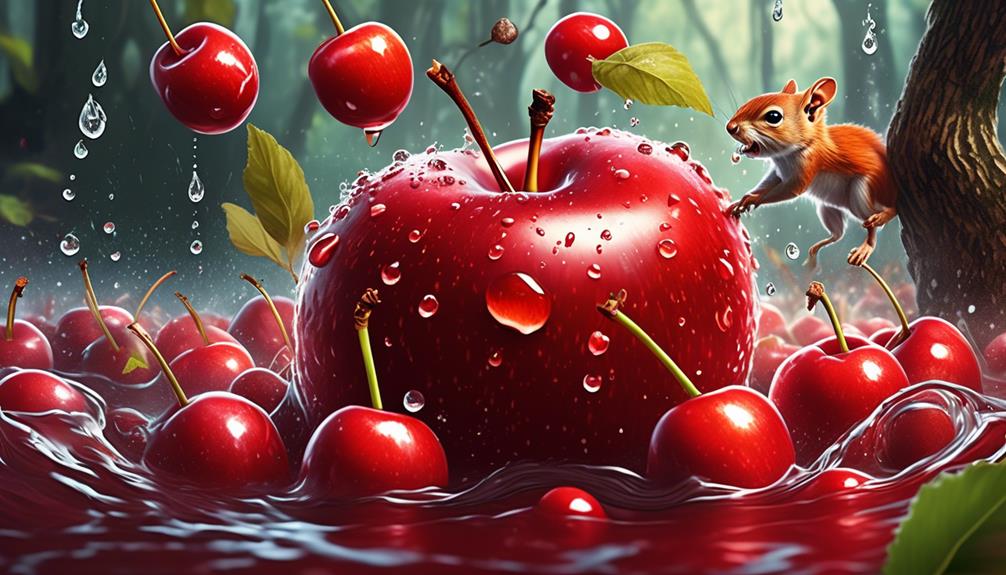
Before feeding cherries to animals, it’s crucial to wash them thoroughly. This simple step ensures hygiene and prevents potential contamination.
Hygiene and Safety
Ensure the hygiene and safety of the cherries by washing them thoroughly before offering them to animals.
Washing cherries before feeding helps remove any dirt, bacteria, or pesticides that may be present on the fruit’s surface. This simple step is essential to protect the animals from potential health hazards.
By washing cherries, you can eliminate any harmful substances that could cause digestive issues or allergic reactions in the animals. It’s important to note that animals have more sensitive digestive systems than humans, so even small amounts of contaminants can have a significant impact on their well-being.
Therefore, taking the time to wash cherries before feeding them to animals is crucial for their overall health and safety.
Preventing Contamination
To maintain the hygiene and safety of the cherries, it’s essential to wash them thoroughly before offering them to animals. Washing cherries helps remove dirt, pesticides, and other contaminants that may be present on the fruit’s surface. These contaminants can be harmful to animals if ingested.
By washing the cherries, you can reduce the risk of contamination and ensure that the animals are consuming clean and safe food. To wash cherries, simply place them in a colander and rinse them under cool running water. Gently rub each cherry to remove any debris or residue.
It’s important to note that washing cherries doesn’t eliminate all potential contaminants, so it’s still important to feed them in moderation and monitor for any adverse reactions in the animals.
Gradual Introduction of Cherries to Animal Diets
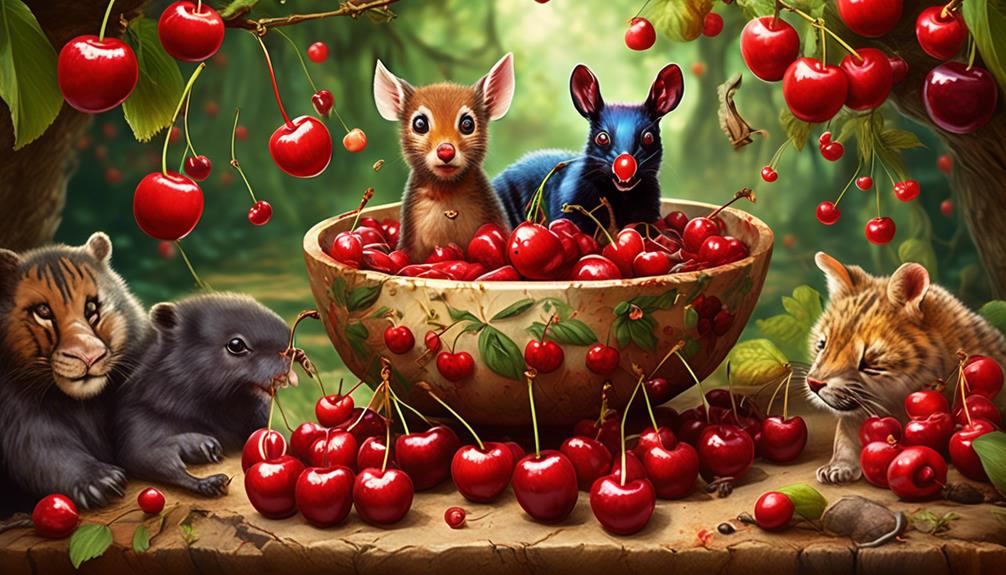
When introducing cherries to an animal’s diet, it’s important to gradually incorporate them to ensure proper digestion and minimize the risk of any adverse reactions. Animals may not be accustomed to the high sugar content of cherries, so introducing them slowly allows their digestive systems to adjust. Start by offering a small amount of cherries and observe how the animal reacts. If there are no signs of discomfort or digestive issues, you can gradually increase the amount over time. It’s crucial to monitor the animal closely during this process to ensure their well-being.
Additionally, some animals may have allergies or sensitivities to cherries. By introducing cherries gradually, you can identify any potential adverse reactions and take appropriate action. If an animal displays signs of an allergic reaction, such as swelling, itching, or difficulty breathing, it’s essential to discontinue feeding cherries immediately and seek veterinary assistance.
Remember to always consult a veterinarian before adding cherries to an animal’s diet, as different species have different nutritional requirements. They can provide guidance on the appropriate amount of cherries to include in their diet and ensure a balanced and healthy nutritional intake.
Monitoring for Allergic Reactions and Digestive Issues
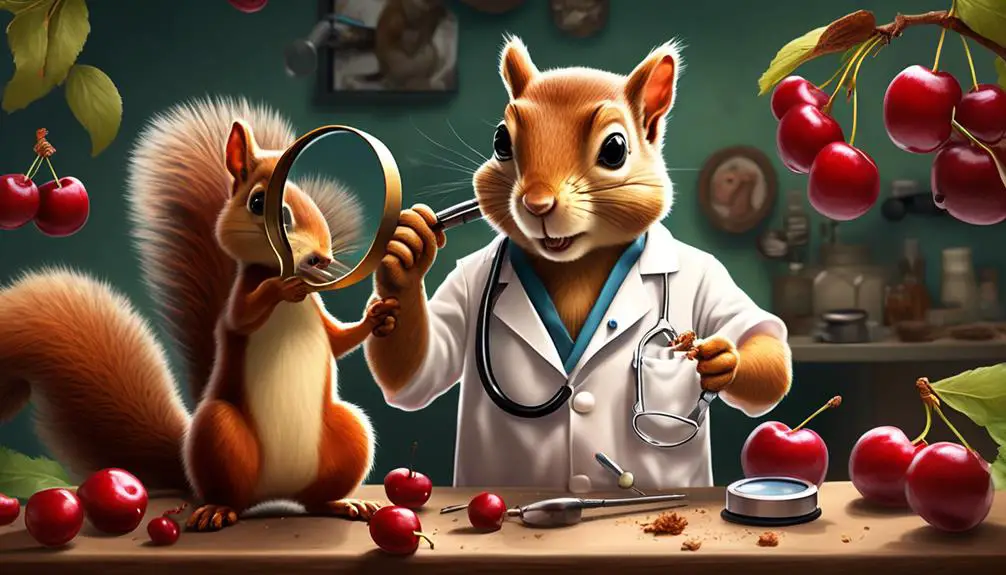
To ensure the well-being of the animal, it’s important to closely monitor for any signs of allergic reactions or digestive issues when introducing cherries to their diet. Animals may have varying reactions to cherries, so it’s crucial to be vigilant during the transition. Keep a close eye on the animal for any changes in behavior, such as excessive scratching, swelling, or difficulty breathing, as these could be signs of an allergic reaction.
Additionally, monitor their digestive system for any signs of discomfort or irregularities, such as vomiting, diarrhea, or bloating. If you notice any of these symptoms, it’s important to consult a veterinarian immediately. They can provide guidance on how to proceed and may recommend removing cherries from the animal’s diet if necessary.
Veterinary Recommendations for Feeding Cherries
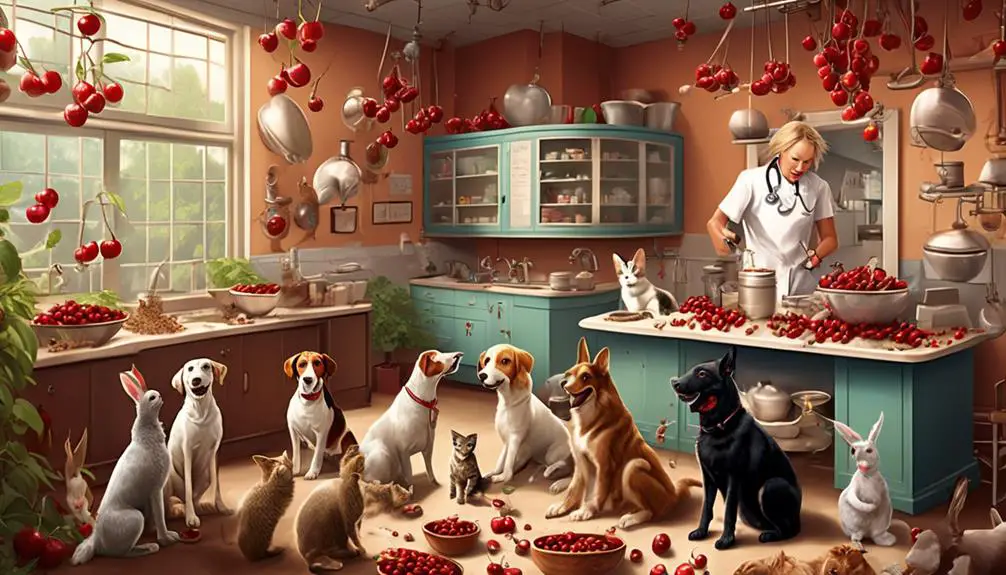
Veterinarians provide valuable recommendations for safely incorporating cherries into an animal’s diet. When it comes to feeding cherries to animals, it’s important to follow certain guidelines to ensure their well-being.
First and foremost, always avoid feeding cherries with pits to animals, as they can be a choking hazard. Additionally, make sure to wash cherries thoroughly before offering them to your furry friends.
Introduce cherries gradually into their diet to allow their digestive system to adjust. Monitor for any allergic reactions or digestive issues that may arise, such as vomiting or diarrhea. If you notice any negative reactions, it’s crucial to consult a veterinarian immediately.
Each animal species has different dietary requirements, so it’s essential to seek specific recommendations from a professional. While cherries can be a nutritious addition to an animal’s diet, it’s important to feed them in moderation.

Erzsebet Frey (Eli Frey) is an ecologist and online entrepreneur with a Master of Science in Ecology from the University of Belgrade. Originally from Serbia, she has lived in Sri Lanka since 2017. Eli has worked internationally in countries like Oman, Brazil, Germany, and Sri Lanka. In 2018, she expanded into SEO and blogging, completing courses from UC Davis and Edinburgh. Eli has founded multiple websites focused on biology, ecology, environmental science, sustainable and simple living, and outdoor activities. She enjoys creating nature and simple living videos on YouTube and participates in speleology, diving, and hiking.

